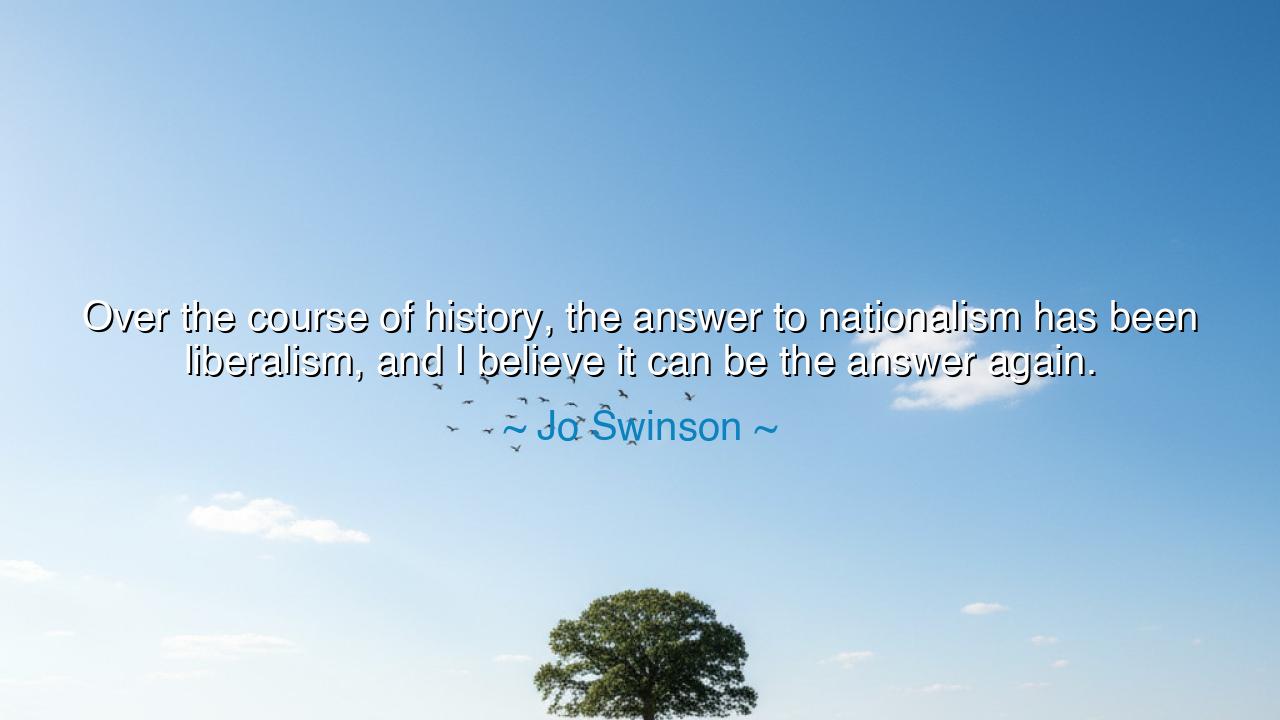
Over the course of history, the answer to nationalism has been
Over the course of history, the answer to nationalism has been liberalism, and I believe it can be the answer again.






“Over the course of history, the answer to nationalism has been liberalism, and I believe it can be the answer again.” — Jo Swinson
Thus spoke Jo Swinson, a leader of her time and a voice for reason in an age of division. Her words are not born of passing politics, but of an ancient and enduring struggle — the conflict between nationalism and liberalism, between the impulse to close the heart and the courage to open it. In this saying, she calls to mind the turning of centuries, when humanity has stood again and again at the same crossroad: whether to build walls of fear or bridges of freedom. She declares that the path of liberalism — of tolerance, of cooperation, of the belief in human dignity beyond borders — has saved the world before, and may yet save it again.
To understand her words, one must know the nature of the forces she names. Nationalism is the cry of the tribe — a fierce and ancient instinct, born of belonging and fear. In its gentlest form, it is pride in one’s land and people; in its darkest, it becomes exclusion and hatred, the belief that one’s nation must rise through the fall of others. Liberalism, by contrast, is the philosophy of the open mind and the open hand — the conviction that freedom, reason, and compassion are not the birthright of one nation, but the shared inheritance of all humanity. Where nationalism says, “We must protect ourselves,” liberalism answers, “We are stronger together.”
Through the ages, the tide of nationalism has risen like a storm — and each time, the light of liberalism has struggled to break through the clouds. When the French Revolution erupted in 1789, it was liberalism — the cry for liberty, equality, and fraternity — that shattered the chains of monarchy and privilege. Yet from its ashes, nationalism arose, carried by those who sought not the brotherhood of man, but the supremacy of one people over another. The wars that followed, the empires that rose, and the millions who suffered — all bore witness to the peril of a love of country that forgets the value of humanity.
In the twentieth century, the world learned this lesson anew. Nationalism, twisted into fanaticism, gave birth to fascism, and the earth burned beneath its weight. But when the flames were finally quenched, what rebuilt the world was not hatred but liberalism — the creation of the United Nations, the signing of human rights charters, the birth of cooperation between nations who had once been enemies. The architects of peace — men and women of conscience like Eleanor Roosevelt, Winston Churchill, and Jean Monnet — knew that the only true answer to division was unity founded on liberty. They proved, as Jo Swinson reminds us, that liberalism is not weakness but strength — the strength to choose dialogue over destruction, compassion over conquest.
The origin of Swinson’s statement lies in this long lineage of thought. As the currents of nationalism once again swell in our own time — as nations turn inward, as fear divides neighbors, as voices cry for isolation — she speaks as one who has studied the cycles of history and seeks to break them. Her faith in liberalism is not naïve; it is historical wisdom reborn. She understands that while nationalism speaks to the heart’s desire for belonging, liberalism speaks to the soul’s yearning for justice — and it is justice that sustains nations when pride has turned to ruin.
Consider the example of post-war Europe, where countries once scarred by centuries of conflict came together to form the European Union. What had divided them before — borders, power, pride — was overcome by the shared belief that peace could be built not through dominance but through cooperation. It was liberalism that laid those foundations: the faith that nations, like people, could prosper more through understanding than through suspicion. And though that union, too, faces trials, its existence stands as living proof of Swinson’s claim — that liberalism has answered nationalism before, and that it may do so again.
So, O listeners and seekers of wisdom, take heed of this teaching: guard your heart against the fire of blind nationalism, but do not extinguish the love of home that warms it. Let your patriotism be noble, not narrow — a love that uplifts your nation without despising others. And above all, practice liberalism of the spirit: the willingness to see the stranger as kin, the foreigner as neighbor, the human being as sacred beyond all flags.
For history is a great teacher, and its lesson is written in the ashes of fallen empires: those who close their borders of the heart will crumble, but those who open them will endure. As Jo Swinson reminds us, the world has been here before. And though the struggle is eternal, the answer remains the same — not in conquest, but in compassion, not in exclusion, but in understanding. The torch of liberalism has lit the darkness before, and if we dare to lift it again, it shall light the world once more.






AAdministratorAdministrator
Welcome, honored guests. Please leave a comment, we will respond soon